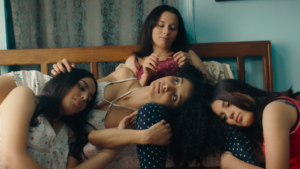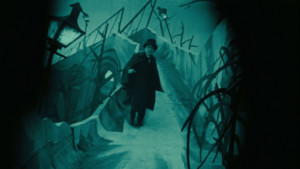
If you wear the right shoes, it takes only 12 minutes to walk between the Oriental and Downer Theatres on Milwaukee’s East Side.
That’s enough time to tell the story of how Milwaukee Film, which revitalized the Oriental after taking over operations in 2017, has now resurrected the historic Downer Theatre. Built as a silent movie house in 1915, the Downer was the oldest active movie theater in the city and had been owned by the national chain Landmark Theaters since 1989. But when Landmark suddenly closed the beloved venue in September, area filmgoers immediately imagined a Hollywood twist and eventually Milwaukee Film confirmed the whisper heard most often.
The nonprofit organization, which runs the annual Milwaukee Film Festival, announced March 5 that it would, indeed, assume year-round operations of the Downer Theatre. The new programming begins April 12 with the sweet sixteen edition of the festival.
Events will officially kick off one day earlier at the flagship Oriental Theatre, which has three auditoriums. Participating again this year are two single-screen venues, the Times Cinema in Washington Heights and the Avalon Theater in Bay View. Adding the Downer’s two rooms gives the Milwaukee Film Festival a total of seven screens to present 300 films from 61 countries over 15 days.
“Our mission has always been to make cinematic experiences possible for as many people as possible, and expanding our footprint in this way is a key next step in doing that,” said Susan Mikulay, chair of Milwaukee Film’s board of directors.
Worth mentioning, though, is how Milwaukee Film’s complicated history with Landmark makes this year’s inclusion of the Downer feel more like a homecoming than an expansion. Landmark once operated both the Oriental and Downer and for many years allowed MFF to partially rent the theaters—in those days, I would often stroll from one to the other for screenings—but that cordial relationship ended seven years ago when Milwaukee Film, seeking more self-sufficiency, wrested away control of the Oriental, one of the nation’s most exalted movie palaces. When the Downer disappeared from the festival, so did some of the neighborhood voltage felt between two storied buildings showing movies in tandem, separated only by a few blocks.
Perhaps that’s why Jonathan Jackson, the festival’s founding artistic director, long dreamed of a five-screen hub on the city’s East Side. Now that Milwaukee Film controls both the Oriental and the Downer, his vision has finally been realized. But in another twist, he won’t be there to lead Milwaukee Film into this new era. Jackson resigned as president and CEO in January.
“It’s a bittersweet decision,” Jackson said. “Milwaukee Film has been a huge part of my life and I’m extremely grateful to have had the opportunity to catalyze the power of film and help build this vital Milwaukee institution from scratch.”
For 16 years Jackson has been synonymous with Milwaukee Film. Would the festival be the festival if there had been no Jonathan Jackson?

Similar questions presumably occupy this year’s opening night documentary “Shari & Lamb Chop,” which explores how ventriloquist and five-time Emmy winner Shari Lewis altered the landscape of children’s television with an iconic sock puppet that first appeared on “Captain Kangaroo” in 1956. Who would Shari Lewis be without Lamb Chop? What would family entertainment be without Shari Lewis?
Pablo Berger’s wonderfully wordless “Robot Dreams,” which will close the festival, could pass as a family-oriented movie about the friendship between an anthropomorphic dog and robot in 1980s Manhattan. It’s a brightly colored buddy comedy with sharp, hand-drawn lines, dynamic editing and a teeming urban backdrop, all of which will speak to children, especially those tired of the frenetic wisecracking that plagues so many animated releases. But adults are more likely to be carried by the film’s emotional currents, as whimsy gives way to wistfulness and an appreciation of what it means for a relationship to resolve.

“Robot Dreams” joins the harrowing migrant odyssey “Io Capitano” and the Tunisian experiment “Four Daughters” as recent Oscar nominees making their local big screen debuts. I can vouch for all three but especially recommend “Four Daughters,” one of the most conceptually exciting movies of the year. Using actors alongside family members, the documentary keeps shifting shape to tell the story of two teenagers lost to religious fanaticism.
Groundbreaking nonfiction methods can also be found in “Anselm,” Wim Wenders’ portrait of Anselm Kiefer, a German artist known for his unflinching paintings and sculptures. Rather than a traditional biography, Wenders has crafted a playful and fluid experience, including long, winding drone shots of Kiefer’s 200-acre work campus in France that convey the scale of his artistic imagination. The movie is currently available to stream—I saw it in March on the Criterion Channel—but our televisions cannot match the MFF screening that will present “Anselm” in its immersive, intended 3D format.

The renowned Anvil Orchestra will recreate the silent movie experience by providing live musical accompaniment for “The Cabinet of Dr. Caligari” (1920), which traps viewers inside the warped perspective of a hypnotist who uses a somnambulist to fulfill his murders. Although this Expressionist horror classic is most famous for its angular, distorted sets, let me submit that it still resonates a century later because it comprehends how watching movies parallels dreaming or, in this case, having a nightmare. Or maybe it’s because the film anticipates a time of gnarled values, a time when a madman could keep sleepwalkers under his spell?
Retro screenings include “Spy Kids” (2001), “Stop Making Sense” (1984) and a special 40th-anniversary presentation of “Footloose.” Let’s hear it for local radio personalities Dori Zori and Kristopher Pollard, who will take audience questions during a live Cinebuds podcast recording.
Among the features that arrive with deafening buzz from the global festival circuit are Raven Jackson’s “All Dirt Roads Taste of Salt,” Babatunde Apalowo’s “All the Colours of the World Are Between Black and White,” Bertrand Bonello’s “The Beast,” Víctor Erice’s “Close Your Eyes,” Radu Jude’s “Do Not Expect Too Much from the End of the World,” Alice Rohrwacher’s “La Chimera,” Hirokazu Kore-eda’s “Monster” and Sean Price Williams’ “The Sweet East.”
The festival runs April 11-25. The full lineup and ticket information are online at mkefilm.org/mff.
